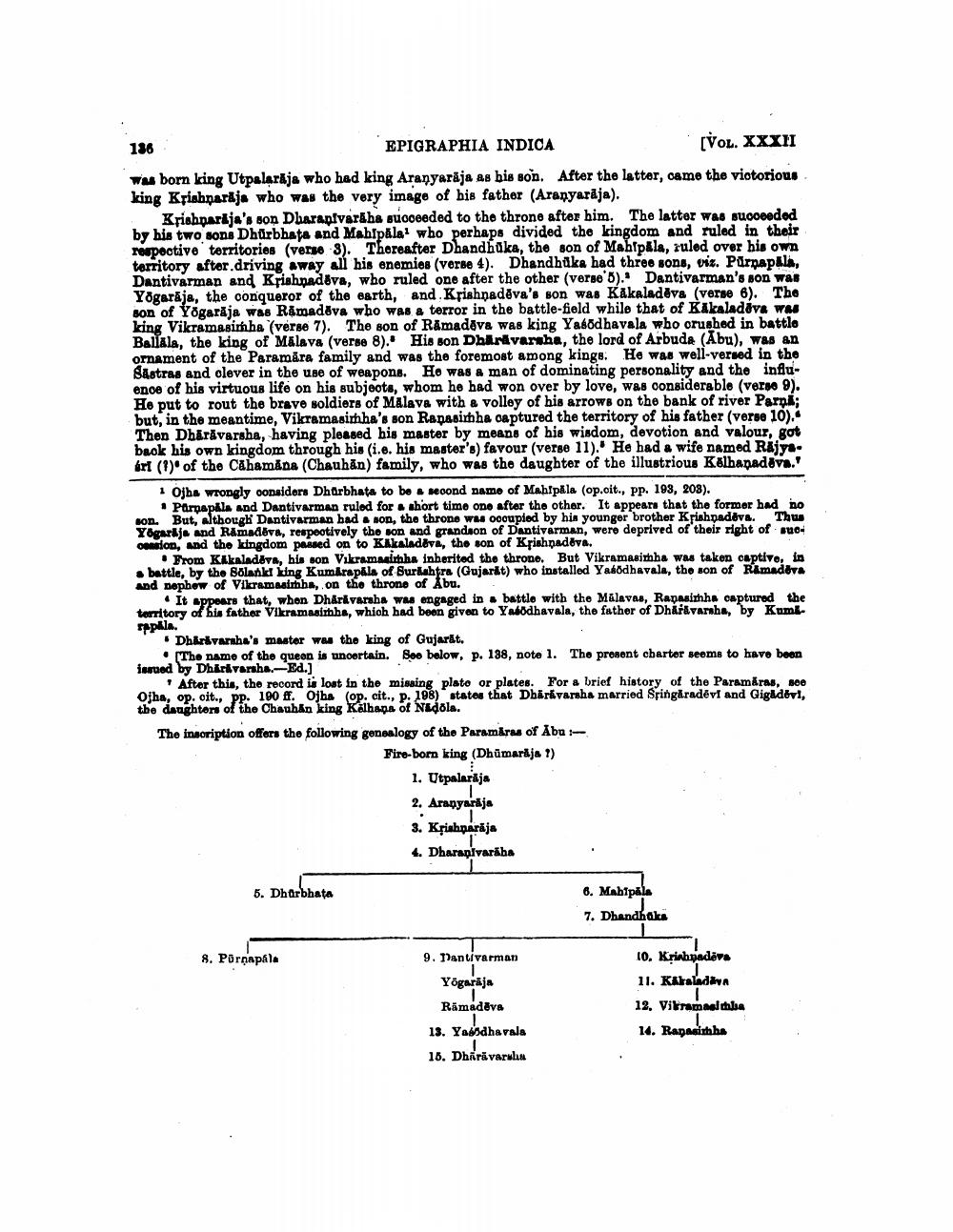________________
136 EPIGRAPHIA INDICA
[VOL. XXXH was born king Utpalaraja who had king Aranyarāja as his son. After the latter,came the victorious king Krishnaraja who was the very image of bis father (Aranyarāja).
Krishnarja's son Dharapivardha succeeded to the throne after him. The latter was succeeded by his two sons Dhurbhata and Mahipala! who perhaps divided the kingdom and ruled in their rospective territorios (vers 8). Thoreafter Dhandhuka, the son of Mahipala, zuled over his own territory after driving away all his enemies (verse 4). Dhandhuka had three sons, viz. Purnapala, Dantivarman and Krishnadáva, who ruled one after the other (verse 8). Dantivarman's son was Yogarāja, the conqueror of the earth, and Krishnadēva's son was Kakaladöva (verse 6). The son of Yogar ja was Råmadova who was a terror in the battle-field while that of Kakaladdva Wa king Vikramasinha (verse 7). The son of Rāmadēva was king Yasodhavala who orushed in battlo Ballala, the king of Mälava (verse 8). His son Dhirdvaruha, the lord of Arbuda (Abu), was an ornament of the Paramāra family and was the foremost among kings. He was well-versed in the Sastras and clever in the use of weapons. He was a man of dominating personality and the influenoe of his virtuous life on his subjeots, whom he had won over by love, was considerable (verso 9). He put to rout the brave soldiers of Malava with a volley of his arrows on the bank of river Parni; but, in the meantime, Vikramasimha's son Ranasimha captured the territory of his father (verse 10). Then Dhärāvarsha, having pleased his master by means of his wisdom, devotion and valour, got baok his own kingdom through his (i.e. his master's) favour (verse 11). He had a wife named Rajya. bri (f) of the Cahamina (Chauhān) family, who was the daughter of the illustrious Kolhapadova.
1 Ojhs wrongly considers Dharbhata to be a second name of Mahipala (op.cit., pp. 199, 208).
• Parpapila and Dantivarman rulod for a short time one after the other. It appears that the former had no son. But, although' Dantivarman bad son, the throne wus oocupied by his younger brother Krishpadeve. Thus Yegardjo and Ramadeva, respectively the son and grandson of Dantivarman, were deprived of their right of suo. contion, and the kingdom passed on to Kikaladeva, the son of Krishpadova.
From Kakaladdva, his son Vikramasinha inherited the throne. But Vikramasimha was taken captivo, in battle, by the Bolanket king Kumarapkla of Burlahtra (Gujardt) who installed Yasodhavala, the son of Ramadora and nephew of Vikramasimbe, on the throne of Abu.
It appears that, when Dhårkvarsha WMA engaged in battle with the Malavas, Ranasinha captured the territory of his father Vikramasimha, which had been given to Yatódhavala, the father of Dhårdvarsha, by Kumi. mpkla.
• Dharivarnha's master was the king of Gujarat.
The name of the quean is uncertain. Soo below, p. 138, note 1. The present charter seems to have been issued by Dhirvanshe. -Ed.]
After this, the record is lost in the missing plate or plates. For a brief history of the Paramaras. See Ojha, op. cit., pp. 100 ff. Ojhs (op. cit., p. 198) states that Dbir varsha married Spingåradevi and Gigldovi, the daughter of the Chauhan king Kolhapa of Nidola. The insoription offers the following genealogy of the Paramiru of Abu :
Fire-born king (Dhūmarăja 1)
1. Utpalarāja 2. Aranyaraja 3. Krishparaja 4. Dharanivarába
5. Dharbhata
6. Mahipala 7. Dhandhaika
8. Poroapále
9. Nantivarman
Yögarāja
Rāmadēva 13. Yassdhavala 18. Dharavarska
10. Krishnadeva 11. Kakaladin 12. Vikramaalla 14. Rapanishha




